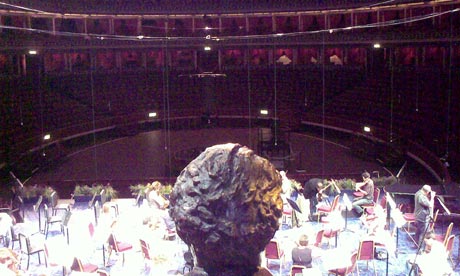 In celebration of Louis Andriessen’s seventieth birthday, the first UK performance of his The Hague Hacking was scheduled for the Prom concert on August 17. The piece was commissioned by the Los Angeles Philharmonic and first performed with that orchestra by the pianists Katia and Marielle Labèque and Esa-Pekka Salonen, who were the performers for the Proms, playing this time with the Philharmonia Orchestra. There were several sources, or perhaps references embedded in The Hague Hacking: the piano parts make use at the beginning and subsequently in the piece of the notes of the beginning of the Lizst Hungarian Rhapsody No. 2, which Andriessen knew not so much from knowing the piece itself as from knowing its use in a Tom and Jerry cartoon, The Cat Concerto (Warner Brothers used the Lizst in a similar way in a fairly well known Bugs Bunny cartoon, Rhapsody Rabbitt); the work also uses a Dutch “sing-along ballad” about The Hague, O, O, The Hague (Andriessen suggested in an interview that the text of this song is vulgar), whose notes are presented first at lengths which render it unrecognizable, but on subsequent reappearances faster, finally, apparently, at the end of the work, at its original speed; in addition the work’s Dutch title, Haags Hakkûh, makes allusion to the slang name (the second word of the title) for what we are told in Robert Adlington’s program note is a “a distinctive kind of dance, characterized by quick ‘chopping’ foot movements, that emerged in Dutch nightclubs in the 1990’s.
In celebration of Louis Andriessen’s seventieth birthday, the first UK performance of his The Hague Hacking was scheduled for the Prom concert on August 17. The piece was commissioned by the Los Angeles Philharmonic and first performed with that orchestra by the pianists Katia and Marielle Labèque and Esa-Pekka Salonen, who were the performers for the Proms, playing this time with the Philharmonia Orchestra. There were several sources, or perhaps references embedded in The Hague Hacking: the piano parts make use at the beginning and subsequently in the piece of the notes of the beginning of the Lizst Hungarian Rhapsody No. 2, which Andriessen knew not so much from knowing the piece itself as from knowing its use in a Tom and Jerry cartoon, The Cat Concerto (Warner Brothers used the Lizst in a similar way in a fairly well known Bugs Bunny cartoon, Rhapsody Rabbitt); the work also uses a Dutch “sing-along ballad” about The Hague, O, O, The Hague (Andriessen suggested in an interview that the text of this song is vulgar), whose notes are presented first at lengths which render it unrecognizable, but on subsequent reappearances faster, finally, apparently, at the end of the work, at its original speed; in addition the work’s Dutch title, Haags Hakkûh, makes allusion to the slang name (the second word of the title) for what we are told in Robert Adlington’s program note is a “a distinctive kind of dance, characterized by quick ‘chopping’ foot movements, that emerged in Dutch nightclubs in the 1990’s.
All of these allusions are very subtle, however. If one knows they’re there, the notes of the Lizst are recognizable, but if one wasn’t looking for them they could easily be missed. The surface of the piece is full of fairly rapidly zig-zagging hocketing notes in rhythms that one could see coming from some kind of house music, but since the bass is fairly consistently in long notes, certainly not suggesting any kind of dance music, the sense that there’s some kind of clubby dance music going on is absent. O, O, the Hague not being a particularly well known tune, outside of Holland anyway, a non-Dutch listener has to take its presence there on faith. What one hears if one isn’t worrying about all these subtle allusions is an engaging, mostly slow, rather monumental work with very active surface texture, although not as lively as all the preliminary information suggested. The orchestration is forcefully sonorous and bell-like and the piece makes an impressive sound.
The concert also included three dances from El amor brujo by De Falla, and two works of Ravel, the Mother Goose ballet (the movements from the original four hand piece, which Ravel turned into a ballet, changing their order and adding music, mostly short interludes connecting the movements, and Bolero. The performance of Mother Goose was astounding and unforgettable due to beauty of the playing, particularly of the winds, and its great subtlety. (more…)



